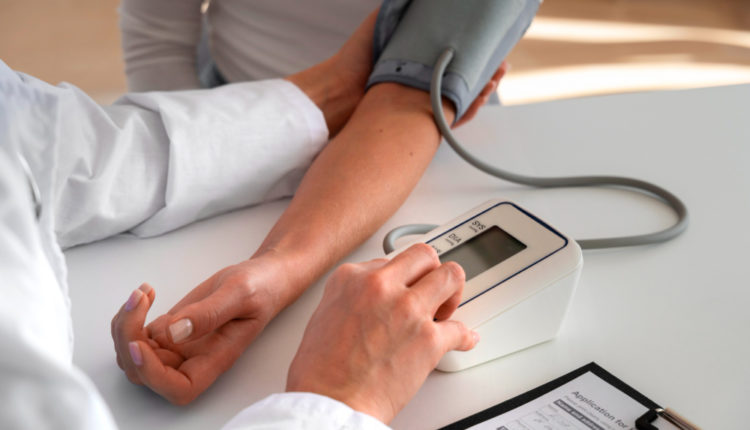Pregnancy is a transformative journey for any woman, but it also brings along its share of health concerns and challenges. One such concern that deserves our attention is “preeclampsia,” a potentially life-threatening condition that can affect both the mother and the baby. Preeclampsia is closely linked to blood pressure, making it a subject of great importance during pregnancy. In this article, we’ll dive deep into the world of preeclampsia and explore how blood pressure plays a pivotal role in this condition.
Understanding Preeclampsia
Preeclampsia is a complex medical condition that typically occurs after the 20th week of pregnancy. It is characterized by high blood pressure (hypertension) and damage to organs such as the liver and kidneys. Preeclampsia can develop suddenly and progress rapidly, making it essential for expectant mothers to be aware of its signs and symptoms.
Causes and Risk Factors
While the exact cause of preeclampsia remains unclear, certain risk factors increase a woman’s chances of developing this condition. These include a history of preeclampsia in previous pregnancies, being pregnant for the first time, and having certain medical conditions like diabetes or chronic hypertension.
Blood Pressure and Its Role
Blood pressure is a vital parameter that measures the force of blood against the walls of your arteries. During pregnancy, your body undergoes significant changes, and blood pressure regulation becomes crucial. Preeclampsia occurs when blood pressure becomes excessively high and remains elevated over time.
Early Signs and Symptoms
Recognizing the early signs and symptoms of preeclampsia is essential for timely intervention. Symptoms may include severe headaches, blurred vision, abdominal pain, and swelling in the hands and face. These warning signs should never be ignored.
Diagnosis and Monitoring
Proper monitoring of blood pressure during pregnancy is a cornerstone of preeclampsia management. Regular prenatal check-ups involve blood pressure measurements to detect any abnormalities early on. Additional tests, such as urine analysis and blood tests, may be ordered to confirm the diagnosis.
Impact on Mother and Baby
Preeclampsia poses significant risks to both the mother and the baby. Complications can include premature birth, low birth weight, and developmental issues for the baby. For the mother, it can lead to organ damage, seizures (eclampsia), and even death if left untreated.
Complications and Consequences
Untreated preeclampsia can lead to severe complications, including HELLP syndrome, which affects the liver and blood-clotting system, and placental abruption, where the placenta separates from the uterus prematurely. These complications can have dire consequences.
Prevention and Management
Preventing preeclampsia and managing it effectively are crucial for a safe pregnancy. Lifestyle changes, such as maintaining a healthy diet and staying active, play a significant role in prevention. Regular prenatal care and adherence to medical advice are essential.
Medications and Interventions
In some cases, medication and medical interventions are necessary to control blood pressure and manage preeclampsia. Medications like antihypertensives may be prescribed, and hospitalization might be required for close monitoring.
Support and Care
The emotional and physical toll of preeclampsia can be overwhelming. Support from healthcare providers, family, and friends is vital during this challenging time. Emotional well-being and mental health are as crucial as physical health.
Advancements in Treatment
Ongoing research and medical advancements are continuously improving our understanding of preeclampsia. New treatments and interventions are being developed to enhance the safety of both mothers and babies.
Real-Life Stories
Hearing about real-life experiences can provide valuable insights. We share stories from women who have battled preeclampsia, highlighting the importance of awareness and timely intervention.
Preeclampsia Awareness
Raising awareness about preeclampsia is essential to ensure early detection and prevention. Advocacy groups and organizations work tirelessly to educate and support expectant mothers and healthcare professionals.
Conclusion: Empowering Mothers-to-Be
In conclusion, preeclampsia and blood pressure are intrinsically linked, and understanding this connection is vital for expectant mothers. By staying informed, seeking regular prenatal care, and taking proactive measures, mothers can take control of their health and give their babies the best start in life.
FAQs (Frequently Asked Questions)
- What are the early signs of preeclampsia?
- Early signs of preeclampsia can include severe headaches, high blood pressure, abdominal pain, blurred vision, and swelling in the hands and face. It’s essential to consult a healthcare provider if you experience any of these symptoms during pregnancy.
- Can preeclampsia be prevented entirely?
- While preeclampsia cannot always be entirely prevented, there are steps you can take to reduce your risk. These include attending regular prenatal check-ups, maintaining a healthy lifestyle, such as eating a balanced diet and staying active, and following medical advice closely.
- Are there any natural remedies to manage blood pressure during pregnancy?
- Managing blood pressure naturally during pregnancy involves practices like reducing sodium intake, staying hydrated, and practicing relaxation techniques such as yoga and meditation. However, always consult with your healthcare provider before attempting any natural remedies, as they can provide guidance tailored to your specific situation.
- How is preeclampsia different from gestational hypertension?
- Preeclampsia is characterized by high blood pressure and organ damage after the 20th week of pregnancy. Gestational hypertension, on the other hand, is high blood pressure that develops during pregnancy but does not involve organ damage. It typically resolves after childbirth.
- What can I do to support a loved one with preeclampsia?
- Supporting a loved one with preeclampsia involves offering emotional support, helping with daily tasks, and ensuring they attend their medical appointments. Being there to listen and understand their concerns can make a significant difference during this challenging time.
Now you know more information about preeclampsia blood pressure

